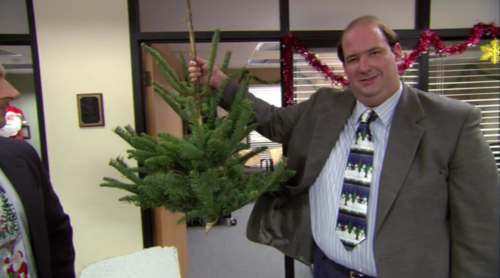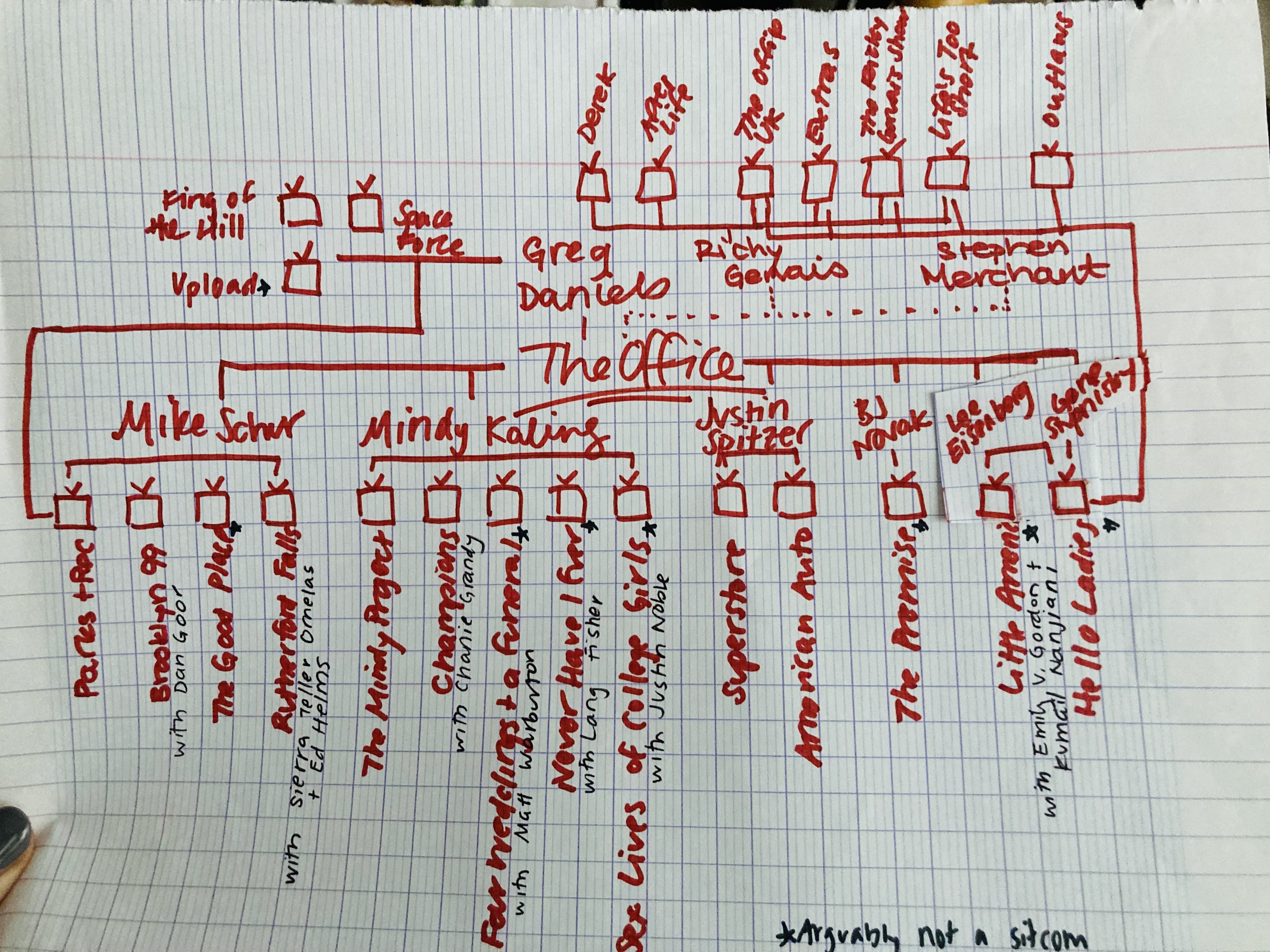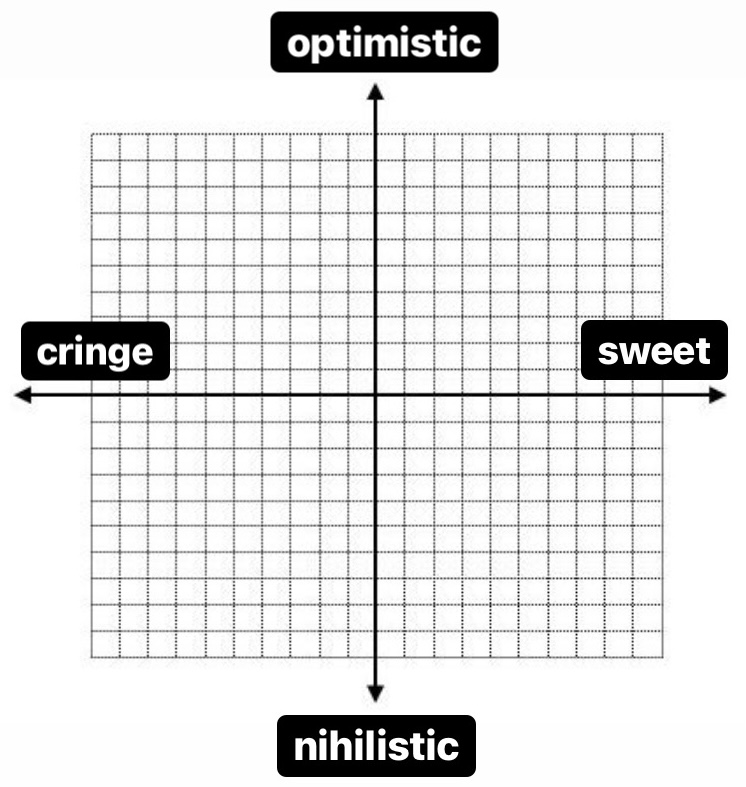- Ope Pardon
- Posts
- Ope Pardon, No. 2: An Office writers coaching tree
Ope Pardon, No. 2: An Office writers coaching tree
How many great sitcoms came from The Office writers' room?

It's not important why — and in truth, I don't know — but I have received unsolicited photos of episodes of The Office on a near-daily basis for the last three months.
Just: A photo of a screen showing Michael Scott or Pam or Creed with a 2-3 word text that is sometimes just "hahaha" or the laughing crying emoji. Every couple days. Since November.
Honestly, it's nice; I am not complaining. I enjoy being the person people go to when they're watching a show that I love and the first time I watched The Leftovers I sent what can only be described as a tsunami of texts about Justin Theroux, so it's not that different from my own messaging behavior. It is, however, inexplicable and funny to me because The Office is not a show I have ever expressed any real opinion on; more to the point, it's not a show I am especially familiar with. Half the time, I have no idea what episode the photo is even from. I am simply just not the person to whom you bring your Office takes — I do not know what to do with them!
(Yes, I realize it's risky to come out as Office agnostic this early in our relationship as writer/reader and that it may threaten, even prohibit, your willingness to hear my pop culture opinions. Listen, I don't not like the show. It's a good show. I don't even think it's overrated; The Office is a Hall of Fame and historically important sitcom. It just does not make me laugh out loud so I never actively seek it out for my viewing pleasure and, consequently, do not have a lot of knowledge, feelings or opinions about it. Please don't unsubscribe.)
In any case, as a result of this development in my life, I have been thinking about The Office exponentially more lately than I, a person who has seen it all the way through exactly and only once, usually does. Mostly, if I'm being honest, I have been thinking about all the sitcoms I like better than The Office — especially those written by Office alum. See, I am a big fan of sitcoms as a genre. I have even spent some of the last year developing a well of wildly pretentious scholarly knowledge about how (and why) sitcoms works on a structural, cultural and emotional level, which, lucky for you, this particular newsletter is not about. And that is because it's about a tree.

A photo I found when I googled "The Office tree." Do I know what episode this is from? Of course not. (Credit: NBC)
Back when I worked in Sports, I was introduced to the concept of the coaching tree. What I retained is that the coaching tree is like a family tree, but instead of genetic relationships, it shows head/assistant coach ties and, theoretically, a generational distribution of coaching style. As I kept seeing recognizable names in the writing credits of The Office, I started thinking about what a writing tree for the show might look like. How far did that room's influence stretch with the modern sitcom?
For the exercise, I gave myself ground rules and came up with a methodology. Using IMDb, I made a list of all the writers who had been credited with writing a minimum of 10 episodes of The Office. (Yes, I know IMDb is an imperfect and frequently incorrect source, but do remember I was doing this for fun and because I cannot leave my house for more than an hour due to my dog's isolation anxiety.) Then, I looked at each of those writers' IMDb pages and made a list of all the shows they were credited as creating. I only did one "generation," meaning I have not looked at shows created by writers who wrote 10 or more episodes of Parks and Rec, for example — again because of time and frankly level of investment in the project.
Ultimately, the exercise was both more and less illuminating than I expected. Everyone who likes sitcoms and cares remotely about behind-the-scene credits knows Mike "Sitcom Midas" Schur came from The Office's writers' room — ditto Mindy Kaling, though I suppose some casual viewers who know her as Kelly might not know she also wrote on the show. Or that Schur also appeared on the show as Mose Schrute. In any case, here is my little sketch and some thoughts on the tree.

The Office writers coaching tree. Sorry if you cannot read my handwriting; this was like my tenth attempt to space this out correctly.
Those are some good shows! If I was inclined to draw more charts, which I'm not, I might also want to graph them from "Most like The Office" to least.
I don't think it's controversial to say Kaling went furthest afield, tonally, refining her brand of sweet-cringe comedy around the female experience and relationships, often but never exclusively romantic. After Mindy Project and Champions, her work falls more primarily in the romcom and coming of age categories and structurally follows a serial, not series, model, but I promised not to get pedantic here.
In contrast, Spitzer has hewed most closely to The Office's recognizable DNA of workplace tedium and often-terrible people. There's an abundance of Reddit posts highlighting the similarities between Superstore and The Office. Personally, I think the former distinguishes itself as its own show on the level of execution and ambition — I think it's ludicrous to compare the two show's unionizing storylines, for example — but I will acquiesce that the character and plot similarities are there. American Auto is only four episodes into its first season but seems cut from the same cloth.
Furthermore, placed next to Spitzer, Schur's shows seem more notably his own than I perhaps previously gave them credit for. Parks and Rec, which was co-created by Office adaptor Greg Daniels, is in retrospect an obvious bridge between Schur's work, featuring both the mockumentary and workplace form of The Office but also the optimism and thematic interest in interpersonal accountability that has come to characterize his later sitcoms.
On that subject, I'm also interested in how you might plot the tone of these second-gen shows. (In fact, I started to and then decided I did not have a good enough knowledge of the shows to confidently plot them, but the chart is below if you do!) To me, Kaling and Schur doubled down on the warmth and sentimentality that I associate with The Office's later seasons; Spitzer, Stupnitsky and Eisenberg have maintained a much stronger commitment to the cringe and, at times, cruel.

Go wild.
If you do want to plot, here are all the second-gen shows —
Parks and Rec
Brooklyn 99
The Good Place
Rutherford Falls
The Mindy Project
Champions
Four Weddings and a Funeral
Never Have I Ever
Sex Lives of College Girls
Superstore
American Auto
The Premise
Little America
Hello Ladies
In closing (almost), I did want to add a brief note on the names not discussed: I tried to focus on the writers for whom The Office was their first big or notable credit, which mainly meant excluding Ricky Gervais and Stephen Merchant (who created and wrote the British original) and Greg Daniels (who developed, i.e., created, the U.S. version and already had one massively successful sitcom to his name). I also didn't discuss Lee Eisenberg and Gene Stupnitsky's shows: That is simply because I have only seen the pilot of Hello Ladies and none of Little America (which is also not a sitcom). Additionally, many of the second-gen shows have co-creators in addition to their Office alum, and I tried to note them all as best I could too. Teamwork makes the dreamwork.
On the subject of sitcoms...
You should be watching Abbott Elementary. It's on NBC and Hulu; for my Europeans I believe our best bet right now is via VPN. Creator Quinta Brunson does not come from any sitcom writer room legacy, but she is/will be the trunk (?) of her own sitcom tree one day for sure. Abbott Elementary is, stylistically and structurally, a true sitcom — workplace and mockumentary no less — and routinely laugh out loud funny.
But what do I know, I don't laugh at The Office.
More soon.
Shea